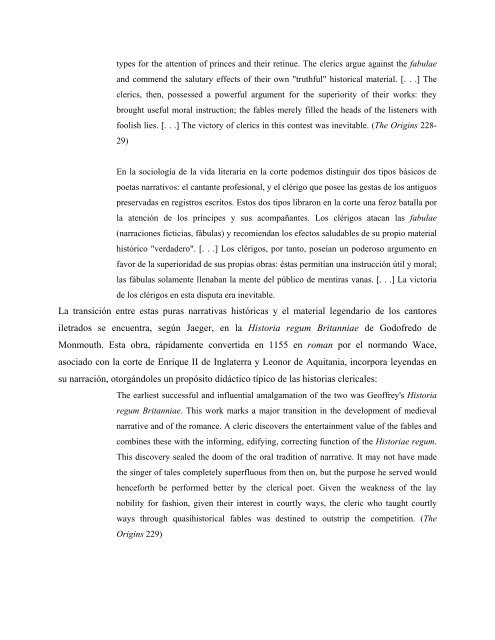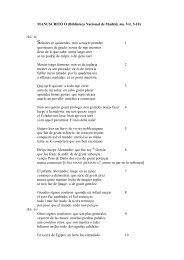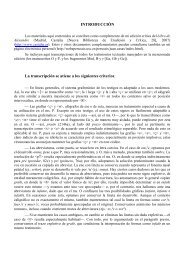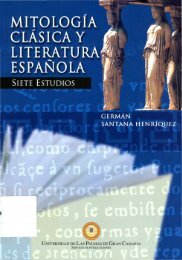- Page 1 and 2:
Antonio Sánchez Jiménez LA LITERA
- Page 3 and 4:
y de los infantes. 33 I. B. 3-. Una
- Page 5 and 6:
III. A. 7-. La educación del autor
- Page 7 and 8:
V. B. 1-. Vida de don Rodrigo Jimé
- Page 9 and 10:
I. A. La literatura de la corte de
- Page 11 and 12: ebus Hispaniae, delatará la depend
- Page 13 and 14: analizando el material de la cancil
- Page 15 and 16: permanecía en ella la totalidad de
- Page 17 and 18: se convirtió en leyenda. 4 Tras el
- Page 19 and 20: Otro hijo de Alfonso VIII y doña L
- Page 21 and 22: Fama regis conclussit mare et nomen
- Page 23 and 24: La campaña duró desde 1178 hasta
- Page 25 and 26: pacto, los ejércitos de Aragón y
- Page 27 and 28: volvió a emplear su máquina diplo
- Page 29 and 30: numerosas plazas alavesas. Además,
- Page 31 and 32: otra parte, Alfonso VIII también e
- Page 33 and 34: sol con la sombra de los árboles;
- Page 35 and 36: Pues unos, teniendo por imposible e
- Page 37 and 38: Además de este botín y de la enor
- Page 39 and 40: officialise le statut des écoles d
- Page 41 and 42: "fugientes curias" (185), "móviles
- Page 43 and 44: eales, como sucedía con los titula
- Page 45 and 46: El estudio de la historia del reina
- Page 47 and 48: me gusta tan poco su compañía com
- Page 49 and 50: Edad Media para fortalecer la autor
- Page 51 and 52: Nieto Soria señala que los monarca
- Page 53 and 54: [. . .] la cortesía es en su orige
- Page 55 and 56: I. C. 1-. b) Difusión de la ideolo
- Page 57 and 58: promover estrategias y planes a lar
- Page 59 and 60: leída en voz alta, generalmente a
- Page 61: Por tanto, como manifiesta esta cit
- Page 65 and 66: monarca y gobernante. De hecho, la
- Page 67 and 68: como una característica más de la
- Page 69 and 70: castellana propone la piedad religi
- Page 71 and 72: La situación fronteriza y bélica
- Page 73 and 74: en la corte a un autor educado que
- Page 75 and 76: en cierto modo, obligado a fomentar
- Page 77 and 78: II. A. Introducción al estudio de
- Page 79 and 80: Y el rey dice: -Perderá mi amor el
- Page 81 and 82: mayoritariamente por la crítica: a
- Page 83 and 84: conocedor y para intentar difundir
- Page 85 and 86: Fontanals 113), “valiente rey de
- Page 87 and 88: e siei son son douz e plazen; e poi
- Page 89 and 90: aqel pe que porta penden. (Riquer 3
- Page 91 and 92: un día él se encontró con Ramon
- Page 93 and 94: Es difícil juzgar la veracidad de
- Page 95 and 96: y de Aragón y de Navarra; y lo hiz
- Page 97 and 98: Además de esta fanfarronada, la Vi
- Page 99 and 100: como indica Riquer, los documentos
- Page 101 and 102: Guirautz de Calanson si fo uns jogl
- Page 103 and 104: don non es sols ab trenta pars, 39
- Page 105 and 106: cansos. E mesclet se ab lui lo mari
- Page 107 and 108: Diversos poderes intentaron dominar
- Page 109 and 110: sociologistas que hacen depender el
- Page 111 and 112: closing segments of the same stroph
- Page 113 and 114:
conservados, su fecha, lugar de com
- Page 115 and 116:
estudiosos están dispuestos a acep
- Page 117 and 118:
tenemos pruebas de que muchos de lo
- Page 119 and 120:
composición deslabazada y descuida
- Page 121 and 122:
cualificado, que el trovador envía
- Page 123 and 124:
Alegre juglar, del salterio, 60 har
- Page 125 and 126:
corte inglesa de Enrique II y Leono
- Page 127 and 128:
joglars de Gascoingna. Ben saup let
- Page 129 and 130:
hacerlas convenía al texto del poe
- Page 131 and 132:
Que so qe·m det m'estrai er'e·m d
- Page 133 and 134:
por la buenas canciones que él hac
- Page 135 and 136:
la opinión del enamorado, amiga, y
- Page 137 and 138:
qe s'era mia·ill ciutaz, ab l'aver
- Page 139 and 140:
Esta famosa tenso, 66 de la que cit
- Page 141 and 142:
car cavayers era prezatz, e sel que
- Page 143 and 144:
de la época. Por ejemplo, en este
- Page 145 and 146:
also the source of supreme happines
- Page 147 and 148:
aparecen. La lírica, la épica, la
- Page 149 and 150:
que mesura d'amor fruitz es, e drut
- Page 151 and 152:
testimonios de Peire Vidal y Raimon
- Page 153 and 154:
Pues yo que canto apartaría un poe
- Page 155 and 156:
Por lo que respecta a la facetia, o
- Page 157 and 158:
IV Derechamente voy tras una dama d
- Page 159 and 160:
VIII Franc[s] cors gentils, guays e
- Page 161 and 162:
Zohar. De cua lquier manera, aunque
- Page 163 and 164:
cui semblava de cors e de faissos,
- Page 165 and 166:
era franco, liberal y cortés, y co
- Page 167 and 168:
noble, debemos concluir que la func
- Page 169 and 170:
II. E. 2-. b) Sentimiento arqueoló
- Page 171 and 172:
partes del mundo, un esqueleto de b
- Page 173 and 174:
III. A. Introducción: problemas de
- Page 175 and 176:
ut which is commoner in medieval Fr
- Page 177 and 178:
figura cortesana. Finalmente, en la
- Page 179 and 180:
Gautier de Châtillon captura en su
- Page 181 and 182:
monorhyme stanzas of varying length
- Page 183 and 184:
agrupadas en estrofas monorrimas de
- Page 185 and 186:
que el Libro de Alexandre abandona
- Page 187 and 188:
(273), "una producción de inspirac
- Page 189 and 190:
Bibliothèque Nationale a que lo ad
- Page 191 and 192:
gran difusión, por lo que consider
- Page 193 and 194:
hipótesis que denominaré de "data
- Page 195 and 196:
Tout d'abord, bien avant sa prise p
- Page 197 and 198:
Consecuentemente, los últimos trab
- Page 199 and 200:
una pequeña corrección, perfectam
- Page 201 and 202:
64), un razonamiento que se podría
- Page 203 and 204:
Puesto que era perfectamente común
- Page 205 and 206:
Bugedo no era más útil en lo que
- Page 207 and 208:
características que se dan en casi
- Page 209 and 210:
Sin embargo, el consejo de Aristót
- Page 211 and 212:
tirarles a las artes tan preçiosa
- Page 213 and 214:
para siempre con lo que les había
- Page 215 and 216:
e muchos otros buenos de qui sabes
- Page 217 and 218:
Curcio hasta el Alexandreis. Pero,
- Page 219 and 220:
El autor desaprueba explícitamente
- Page 221 and 222:
campañas. De hecho, el poema no de
- Page 223 and 224:
o roxnado non fuesse en la fruent c
- Page 225 and 226:
cualidad. La mesura intenta limitar
- Page 227 and 228:
perdonar al suplicante rey Poro, de
- Page 229 and 230:
la voz como tronido, quexoso 'l cor
- Page 231 and 232:
Como se puede observar, el poeta ca
- Page 233 and 234:
efecto, como luego veremos, la larg
- Page 235 and 236:
Esto se debe al hecho de que a est
- Page 237 and 238:
En estos versos, queda claro que la
- Page 239 and 240:
A continuación, el autor nos infor
- Page 241 and 242:
embrïago nin seas venternero'"), q
- Page 243 and 244:
nin por ojos fermosos nin çapatos
- Page 245 and 246:
En consonancia con esta interpretac
- Page 247 and 248:
lista de virtudes de Alexandre, y a
- Page 249 and 250:
Esta asociación de dos cualidades
- Page 251 and 252:
literaria ("'bien dicto e versifico
- Page 253 and 254:
There are in fact only two of the a
- Page 255 and 256:
movieron a la fuente por amor de be
- Page 257 and 258:
De hecho, no he conseguido encontra
- Page 259 and 260:
incorpora todos y cada uno de los r
- Page 261 and 262:
Entrant de la fazie nda muestra gra
- Page 263 and 264:
si sopiessen en él alguna covardí
- Page 265 and 266:
podemos desta cosa pro d' exemplos
- Page 267 and 268:
díxoles: "Ya, varones, quiero que
- Page 269 and 270:
nunca contrast'avremos si esto queb
- Page 271 and 272:
En quinto lugar, Alexandre anima a
- Page 273 and 274:
especie de facundia de naturaleza b
- Page 275 and 276:
las obras fazen falsas, los puntos
- Page 277 and 278:
ey, al igual q ebe procurar no ser
- Page 279 and 280:
Alexandre, y las simpatías de la v
- Page 281 and 282:
sinon quanto podemos de la tierra s
- Page 283 and 284:
idealizada, puesto que parecen tene
- Page 285 and 286:
maguer avié grant seso, acuçia so
- Page 287 and 288:
la mesura non puede su derecho aver
- Page 289 and 290:
Señores, quien quisiere su alma bi
- Page 291 and 292:
Puesto que la obra fue escrita para
- Page 293 and 294:
de Malkiel 182; Michael, The Treatm
- Page 295 and 296:
conquistas del rey Alexandre son, m
- Page 297 and 298:
ho mbre es, precisamente, christian
- Page 299 and 300:
imperdonable. Esta visión contrast
- Page 301 and 302:
educación del autor, en el punto I
- Page 303 and 304:
arruga en el pergamino, como propon
- Page 305 and 306:
En este contexto teórico se sitúa
- Page 307 and 308:
Menéndez Pidal se centra en el ver
- Page 309 and 310:
Es posterior a 1151-1157, por seña
- Page 311 and 312:
mio Cid expresa una preocupación p
- Page 313 and 314:
IV. B. 3-. La educación del autor.
- Page 315 and 316:
En segundo lugar, Burke considera q
- Page 317 and 318:
Edad Media, el lenguaje legal estab
- Page 319 and 320:
est of the old system being retaine
- Page 321 and 322:
esta práctica jurídica fomentada
- Page 323 and 324:
territorios de la actual Francia. L
- Page 325 and 326:
Existen varios ejemplos castellanos
- Page 327 and 328:
misma Historia Roderici muestra a u
- Page 329 and 330:
vos con la gorra de fiesta, yo con
- Page 331 and 332:
compañero, como si de una buena no
- Page 333 and 334:
Además, esta mesura resulta pareci
- Page 335 and 336:
es lo que ocurre cuando describe a
- Page 337 and 338:
De este modo, injustamente movido y
- Page 339 and 340:
non vio allí dó s'alçasse, nin c
- Page 341 and 342:
las dos le desmanchan e la tercera
- Page 343 and 344:
presentado en la obra bastante favo
- Page 345 and 346:
Mio Cid a sus fijas ívalas abraça
- Page 347 and 348:
justo antes de ir a cortes. Por con
- Page 349 and 350:
todos sombreros muy ricos, Rodrigo
- Page 351 and 352:
En segundo lu gar, el Cid cumple co
- Page 353 and 354:
cómmo sirva a doña Ximena e a las
- Page 355 and 356:
En suma, el presentar al Cid como u
- Page 357 and 358:
en los hombres del Cid debe de ser
- Page 359 and 360:
aunque la liberalidad descrita en e
- Page 361 and 362:
"Evades aquí oro e plata, una hues
- Page 363 and 364:
ocurre en muchos otros casos con ot
- Page 365 and 366:
con los moros peninsulares. Sin emb
- Page 367 and 368:
"Non se faz la fazienda por cabello
- Page 369 and 370:
Alexandre por estas dos corrupcione
- Page 371 and 372:
ien lo acorren mesnadas de cristian
- Page 373 and 374:
la sierra e los otros contra la agu
- Page 375 and 376:
Como se puede observar, el Cid deja
- Page 377 and 378:
acá posaré con todos aquestos mio
- Page 379 and 380:
la ganancia"). Es decir, el Cid usa
- Page 381 and 382:
Como se puede apreciar, el Cid usa
- Page 383 and 384:
de los soldados del Cid defender s
- Page 385 and 386:
En muchas de sus intervenciones, el
- Page 387 and 388:
el Poema de mio Cid rechace la face
- Page 389 and 390:
Como ya he apuntado en varias ocasi
- Page 391 and 392:
las teorías de Foucault sobre la a
- Page 393 and 394:
de don Rodrigo Jiménez de Rada, el
- Page 395 and 396:
caso se podría sostener, con Alons
- Page 397 and 398:
ostenta la firma de un Diego Garcí
- Page 399 and 400:
Aparte de la "Epístola" de Jiméne
- Page 401 and 402:
En suma, la revolución en el estil
- Page 403 and 404:
Est itaque ordo talis. Sequens opus
- Page 405 and 406:
Christus vincit in agricolis sive a
- Page 407 and 408:
gratia plena Dominus tecum", "Ave M
- Page 409 and 410:
gran grupo cuando se produjo, y de
- Page 411 and 412:
cum udaspi phylosopho. vel cum albi
- Page 413 and 414:
Estas dos series, junto con otras d
- Page 415 and 416:
dicha fórmula en la nación vecina
- Page 417 and 418:
oppositis predictorum: cervicosa su
- Page 419 and 420:
Escribo, así, cuando todo el mundo
- Page 421 and 422:
V. A. 2-. d) i. Introducción: prel
- Page 423 and 424:
Además de con estas y otras cosas,
- Page 425 and 426:
cum silvestro. compatiens cum theod
- Page 427 and 428:
frente al que propone la imagen ide
- Page 429 and 430:
largissimus. magnus gregorius. in s
- Page 431 and 432:
Por ejemplo, aparecen virtudes como
- Page 433 and 434:
moveat indirecte. Sicut enim scurri
- Page 435 and 436:
Pienso también que no falta retór
- Page 437 and 438:
Ahora anteriormente, la cortesía d
- Page 439 and 440:
Cuando no hay regla en los vestidos
- Page 441 and 442:
Alfonso VIII, en el que la monarqu
- Page 443 and 444:
V. B. Don Rodrigo Jiménez de Rada
- Page 445 and 446:
Y para que el ramillete de sus obra
- Page 447 and 448:
Jiménez de Rada termina su famosa
- Page 449 and 450:
Gothis pericia sua tradens mirabili
- Page 451 and 452:
ey tan significativo como Wamba. En
- Page 453 and 454:
En cuanto al segundo de los adjetiv
- Page 455 and 456:
Y para que la inductora de estas mu
- Page 457 and 458:
Toledano distingue entre musulmanes
- Page 459 and 460:
Era una persona bondadosa, piadosa
- Page 461 and 462:
V. B. 2-. f) Facundia. Es necesario
- Page 463 and 464:
la cruzada de Las Navas de Tolosa.
- Page 465 and 466:
políticos. En efecto, Alfonso VIII
- Page 467 and 468:
Por el momento, el análisis de la
- Page 469 and 470:
et inde sicut diuidit calciata, qui
- Page 471 and 472:
que lo que necesitaba España para
- Page 473 and 474:
ueritate historie dubitatur, dilige
- Page 475 and 476:
lèse-majesté; so he shut his eyes
- Page 477 and 478:
La ocasión era el solaz del monarc
- Page 479 and 480:
de España, tiraron hacia donde les
- Page 481 and 482:
los consejos del Toledano. De este
- Page 483 and 484:
lo que tanto esa alianza como la pi
- Page 485 and 486:
VI. A. Alfonso VIII de Castilla, re
- Page 487 and 488:
En el capítulo IV, descubro que el
- Page 489 and 490:
Esta poderosa visión arqueológica
- Page 491 and 492:
Obras citadas Abad, Francisco. "Po
- Page 493 and 494:
Burke, James F. Structures of the T
- Page 495 and 496:
---. "Laws of Literary Interference
- Page 497 and 498:
del siglo XIII". Cuadernos de Histo
- Page 499 and 500:
---"Jongleur as Propagandist: The E
- Page 501 and 502:
%Milà i [ojo, cambiar la y a i] Fo
- Page 503 and 504:
%Rajna, Pio. Le origini dell'epopea
- Page 505 and 506:
Valbuena Prat, Angel. Historia de l





